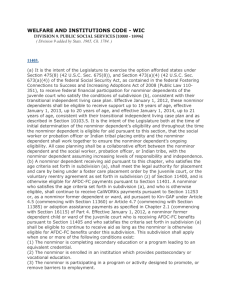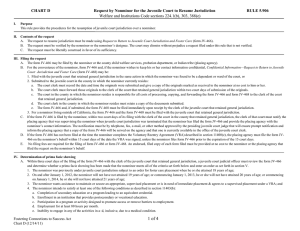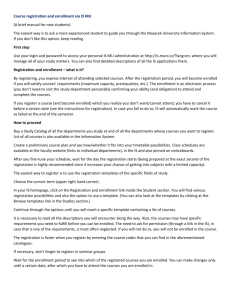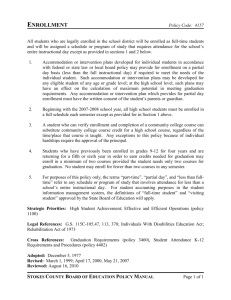Definitions of Participation Conditions
advertisement
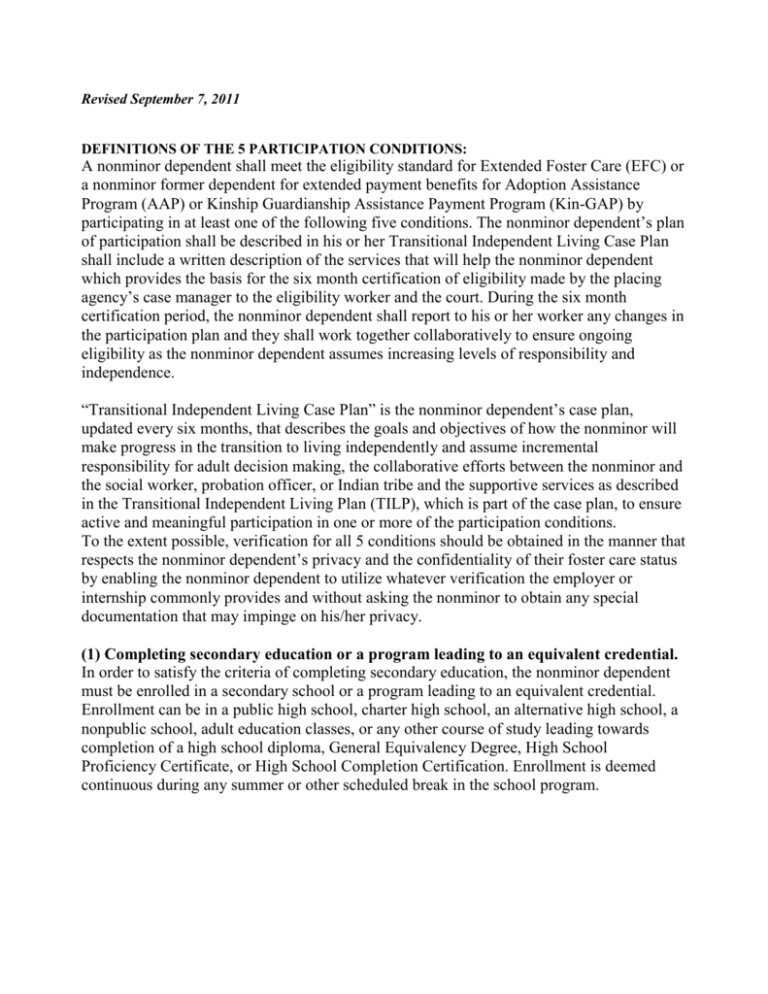
Revised September 7, 2011 DEFINITIONS OF THE 5 PARTICIPATION CONDITIONS: A nonminor dependent shall meet the eligibility standard for Extended Foster Care (EFC) or a nonminor former dependent for extended payment benefits for Adoption Assistance Program (AAP) or Kinship Guardianship Assistance Payment Program (Kin-GAP) by participating in at least one of the following five conditions. The nonminor dependent’s plan of participation shall be described in his or her Transitional Independent Living Case Plan shall include a written description of the services that will help the nonminor dependent which provides the basis for the six month certification of eligibility made by the placing agency’s case manager to the eligibility worker and the court. During the six month certification period, the nonminor dependent shall report to his or her worker any changes in the participation plan and they shall work together collaboratively to ensure ongoing eligibility as the nonminor dependent assumes increasing levels of responsibility and independence. “Transitional Independent Living Case Plan” is the nonminor dependent’s case plan, updated every six months, that describes the goals and objectives of how the nonminor will make progress in the transition to living independently and assume incremental responsibility for adult decision making, the collaborative efforts between the nonminor and the social worker, probation officer, or Indian tribe and the supportive services as described in the Transitional Independent Living Plan (TILP), which is part of the case plan, to ensure active and meaningful participation in one or more of the participation conditions. To the extent possible, verification for all 5 conditions should be obtained in the manner that respects the nonminor dependent’s privacy and the confidentiality of their foster care status by enabling the nonminor dependent to utilize whatever verification the employer or internship commonly provides and without asking the nonminor to obtain any special documentation that may impinge on his/her privacy. (1) Completing secondary education or a program leading to an equivalent credential. In order to satisfy the criteria of completing secondary education, the nonminor dependent must be enrolled in a secondary school or a program leading to an equivalent credential. Enrollment can be in a public high school, charter high school, an alternative high school, a nonpublic school, adult education classes, or any other course of study leading towards completion of a high school diploma, General Equivalency Degree, High School Proficiency Certificate, or High School Completion Certification. Enrollment is deemed continuous during any summer or other scheduled break in the school program. A nonminor dependent who is participating in special education activities as described in his/her Individualized Education Plan (IEP) is deemed to be in compliance with this participation condition. Verification of enrollment can be satisfied by requesting that the participant provide proof of enrollment that indicates the courses that the student is enrolled in. Acceptable documentation could include, but is not limited to, an unofficial transcript, an electronic copy of the nonminor dependent’s current course schedule, or a letter from the institution or other similar documentation. Examples of How a Nonminor Dependent Meets Requirement for Completing High School or Secondary Education In order to be considered participating in a program that is leading towards completion of a high school or secondary education, the youth can be doing one of the following (including but not limited to): 1. 2. 3. 4. 5. 6. 7. 8. Independent study Nonpublic School Public High School Home Schooling Private High School Alternative High School/Continuation School Special Education Classes Adult School (to complete GED) (2) Enrolled in an institution which provides postsecondary or vocational education. In order to satisfy the criteria of enrollment in an institution which provides post-secondary or vocational education a nonminor dependent must be enrolled at least half-time. In most institutions, including the California public college and university systems, this will consist of enrollment in at least six semester course units or quarter course equivalent. In some cases a different standard of tracking enrollment may be utilized by an institution, such as some vocational courses which define enrollment in “clock hours” rather than credits, and the half-time standard should be applied accordingly. Further, satisfaction of the enrollment requirement does not require formal admission to an institution and includes situations where a student is enrolled in individual courses without being enrolled in the institution, such as University extension courses. Courses taken at any institution which is licensed to operate in the State of California, or taken at a comparable institution located or licensed to operate in another state, shall count towards the participation requirement. Nonminor dependents can take coursework at multiple institutions to equal the half-time standard. If a nonminor must take remedial courses as a pre-requisite to enroll in standard general education coursework, these courses are also eligible even if they do not meet the standard amount of units as other coursework (three units per class). In these cases, the part-time equivalent of two courses would apply and qualify the nonminor as meeting the postsecondary education requirements. This provision also applies to participants on a summer or other scheduled school breaks or who are awaiting admissions determinations or pending enrollment in courses. Official school breaks do not disqualify youth from meeting the eligibility criteria. Participants who are enrolled in post-secondary education or vocational training at less than half time, but in at least one course, do not qualify under this participation condition, but can qualify for EFC benefits under participation condition #3 (an activity designed to promote, or remove barriers to employment). Additionally, if a student drops courses mid-term (whether considered voluntary or involuntary) this shall not result in automatic disqualification from EFC benefits. The nonminor dependent should be given a reasonable amount of time to start participation in a different participation condition. Participation in condition #3 is the best option to transition a nonminor dependent into another participation condition or to bridge the gap if he/she wants to enroll in classes again the next semester. Verification of enrollment at a post secondary or vocational institution can be made by requesting that the participant provide proof of enrollment that indicates the credit and noncredit courses that the student is enrolled in. Acceptable documentation could include, but is not limited to, an unofficial transcript, an electronic copy of the student’s current course schedule, or a letter from the institution or other similar documentation. Official transcripts are not required. Examples of How a Nonminor Dependent Meets the Postsecondary Education/ Training Requirements: Eligible Institutions Eligible Institutions include, but are not limited to: • • • • • • All public postsecondary systems in California (Community College, California State University and University of California); All public postsecondary systems outside of California (Community Colleges and Universities); Schools approved by the Bureau for Private Postsecondary Education; Schools accredited through the Western Association of Schools and Colleges; Schools approved or accredited through a similar body in another state; Courses taken through correspondence or on-line studies that are affiliated with a licensed institution count towards the participation requirement. Unavailable Coursework If a nonminor dependent is unable to enroll in any coursework due to required classes being full, participation condition # 3 should be used for supporting the nonminor dependent until the nonminor dependent can enroll in the next available semester. Additionally, if a nonminor dependent is only able to enroll in one course and does not meet the part-time requirement, the nonminor dependent is eligible under participation condition #3 and this should be documented on the Transitional Independent Living Case Plan if it is not already listed as a back-up plan. Impact of Dropping Courses Additionally, if a student drops courses mid-term (whether considered voluntary or involuntary), this shall not result in automatic disqualification from AB12 benefits. If this happens, it is best to use the back-up plan of participation condition #3. If the nonminor dependent does not wish to do this then the court must review the circumstances surrounding the student’s decision to determine if the nonminor dependent can maintain eligibility until there is opportunity to re-enroll in the following term. There are many factors that may result in failing to complete courses in which they enrolled. Circumstances that would be considered as extenuating factors could include, but are not limited to: a. The student has learning disabilities or mental health issues (diagnosed or undiagnosed) that prevented the student from successfully completing the coursework. b. A personal or family emergency, such as the loss of housing, family illness, medical emergency, or intervention by the young person’s family of origin interfered with the student’s ability to complete coursework. c. A lack of affordable childcare interfered with the student’s ability to attend classes or complete coursework. d. The courses in which the student enrolled were inappropriate for his/her skill level and the student must first take remedial classes or access tutoring services in order to successfully complete college level coursework. e. A delay in financial assistance or other financial hardship presented a barrier to completing coursework. (3) Participating in a program or activity designed to promote, or remove barriers to employment. A program or activity designed to promote, or remove barriers to employment is an individualized program based on a youth centered assessment of skills and needs. These activities could be self-directed, completed in conjunction with a nonminor dependent’s caregiver or social worker, or part of an organized program. Unpaid employment, internships, volunteer activities, vocational rehabilitation or participation in a substance abuse program also meet this participation condition. A nonminor dependent shall be deemed participating in a program or activity designed to promote, or remove barriers to employment as long as the youth is working toward meeting goal(s) in his/her Transitional Independent Living Case Plan by participating in an Independent Living Program activity or a program that moves the youth forward in reaching a goal on his/her TILP. See Attachment C for sample activities. A nonminor dependent who is meeting eligibility requirements solely through this participation condition should be working toward developing skills that will help him/her to transition to the education or employment participation condition to ensure that he/she is adequately prepared to transition to independence at the end of his/her time in EFC. This participation condition is intended to help bridge gaps in a nonminor dependent’s readiness for achieving more responsibility in college, vocational school or employment. For nonminor dependent’s meeting eligibility solely through this requirement, at the six month certification period it should be considered if the nonminor dependent can successfully move to another eligibility condition. This participation condition should always be used as a back-up plan for the nonminor dependent’s TILP in case the nonminor dependent intentionally or unintentionally experiences a break in participation in an educational or employment activity part way through the six month eligibility certification period. For example, the nonminor dependent quits his/her job but does not have other employment lined up. For a nonminor who is re-entering foster care after a break, the initial meeting with the social worker to select the participation activity satisfies the requirement of removing barriers to employment. However, the nonminor must begin participating in the activity within a reasonable amount of time after re-entry. Verification for this condition will vary depending on the activity that nonminor dependents are participating in. A certificate of completion for a class or training is sufficient for more formal or structured programs. However, as this category is very broad, verification can also be as flexible as documentation in a case manager’s notes when the NMD shows the case manager a revised resume or discusses the outcome of job searches and/or interviews. The program or activities designed to remove barriers to employment that the youth participates in may include, but not be limited, to: • job skill classes/training; • distance learning; • on-line tutorials; • job shadowing; • mentoring; • volunteering; • internship and apprenticeship; • resume/interview skills classes/training; • career exploration classes/training/programs; • dress/hygiene/health care management classes/training/; • counseling/therapy; • social skills classes/training/programs; • anger management classes/training/programs; • substance abuse treatment; • mental health treatment, • domestic violence/date violence programs, • teen parent classes or programs, • navigating public transportation, • registering and participating with the OneStop, • budget and money management classes/training/programs, • driver’s education, • enrolled in ILP or participating in ILP, • Workforce Investment Act case management, • Enrollment in at least one course at college or a vocational program for credit or non-credit. Non-credit courses which count towards the participation requirement include, but are not limited to, the following classifications of courses: Basic Skills Developmental or Remedial Education English as a Second Language (ESL) courses College and Career Planning or College Success Skills Courses Workforce Preparation Courses Education Programs for Persons with Substantial Disabilities Home Economics Careers and Technology Not-for-credit Vocational Programs Courses taken through University of California Extension or Cal State Open University • Other such activities designed to promote or remove barriers to employment. (4) Employed for at least 80 hours per month. In order to satisfy the criteria of employed for at least 80 hours a month a nonminor dependent must be engaged in full or part time employment activities which includes, but is not limited to paid internships, apprenticeships, Ticket to Work (for individuals receiving Supplemental Security Income), or work study programs. The nonminor dependent can be engaged in a combination of paid employment activities at one or more places of employment in order to meet the 80 hours a month requirement. As long as the nonminor dependent is scheduled to work at least 80 hours a month, he/she shall be deemed to meet this participation condition even if the nonminor dependent does not actually work that number of hours due to holidays, illness, approved vacation (by employer) or other circumstances beyond the nonminor’s control. Any earned income shall be disregarded for purposes of eligibility determination as specified in the nonminor dependent’s TILP. Verification of employment for at least 80 hours per month may include, but not be limited to, providing a copy the nonminor dependent’s work schedule, pay stubs, a statement of hiring from the employer, or a statement of acceptance from the apprenticeship or internship program. Examples of Resources and Work Programs 1. Job Corps 2. VISTA 3. Workforce Investment Boards 4. One Stops 5. Ticket to Work (5) Incapable of doing any of the activities described in subparagraphs (1) to (4), inclusive, due to a medical condition, and that incapability is supported by regularly updated information in the case plan of the nonminor dependent. In order to satisfy the eligibility criteria set forth in W&IC section 11403 (b)(5), two determinations must be made. First, a nonminor dependent must have a “medical condition.” Second, the medical condition must render the minor incapable of doing any of the activities described in subparagraphs (1) to (4). A “medical condition” is a physical or mental state that limits a nonminor dependent’s ability to participate in any of the activities described in subparagraphs (1) through (4), as verified by a healthcare practitioner. A healthcare practitioner is defined as any individual provider who is licensed or otherwise authorized by the state, county or city in which the provider is located to provide services related to physical or mental health. If a nonminor dependent does not undertake remedial measures to treat a verified medical condition, he or she will still be deemed to have a qualifying medical condition under this subparagraph. A nonminor dependent is deemed “incapable of doing any of the activities described in subparagraphs (1) to (4)” if he or she cannot consistently meet the criteria of subparagraphs (1) to (4) due to the documented medical condition. Verification that a nonminor dependent cannot consistently meet the full requirements of subparagraphs (1) to (4) can be satisfied by written documentation by a healthcare practitioner which explains that one of the reasons that the nonminor is unable to meet the criteria of subparagraphs (1) to (4) is because he or she has a “medical condition” as defined in this subsection. A nonminor dependent who is eligible for a disability program including, but not limited to, Supplemental Security Income, Social Security Disabled Adult Child benefits, State Disability Insurance, or Regional Center Services may have a medical condition that fits under this participation condition if the medical condition renders him/her incapable of participating in an education plan to complete high school (or equivalent), attend college or vocational school at minimum part-time or maintain part-time employment. The nonminor dependent is deemed eligible for extended benefits under this section upon a verification of eligibility for such a condition. Verification of disability benefits status may include an award letter, notice of action or copy of the check or benefit identification card. The nonminor dependent, unless incapable, is responsible for obtaining and providing the social worker or probation officer with one of the following: (1) the written verification from a healthcare practitioner stating that the nonminor dependent has a medical condition and that he or she cannot consistently meet the full requirements of subparagraphs (1) to (4) or (2) the verification of the nonminor dependent’s disability benefits status. If the nonminor dependent is incapable of obtaining verification the caregiver or social worker will need to assist the nonminor or obtain the verification. Note: These definitions were developed collaboratively with CDSS, CWDA, sponsors of AB 12, county representatives and stakeholders.
